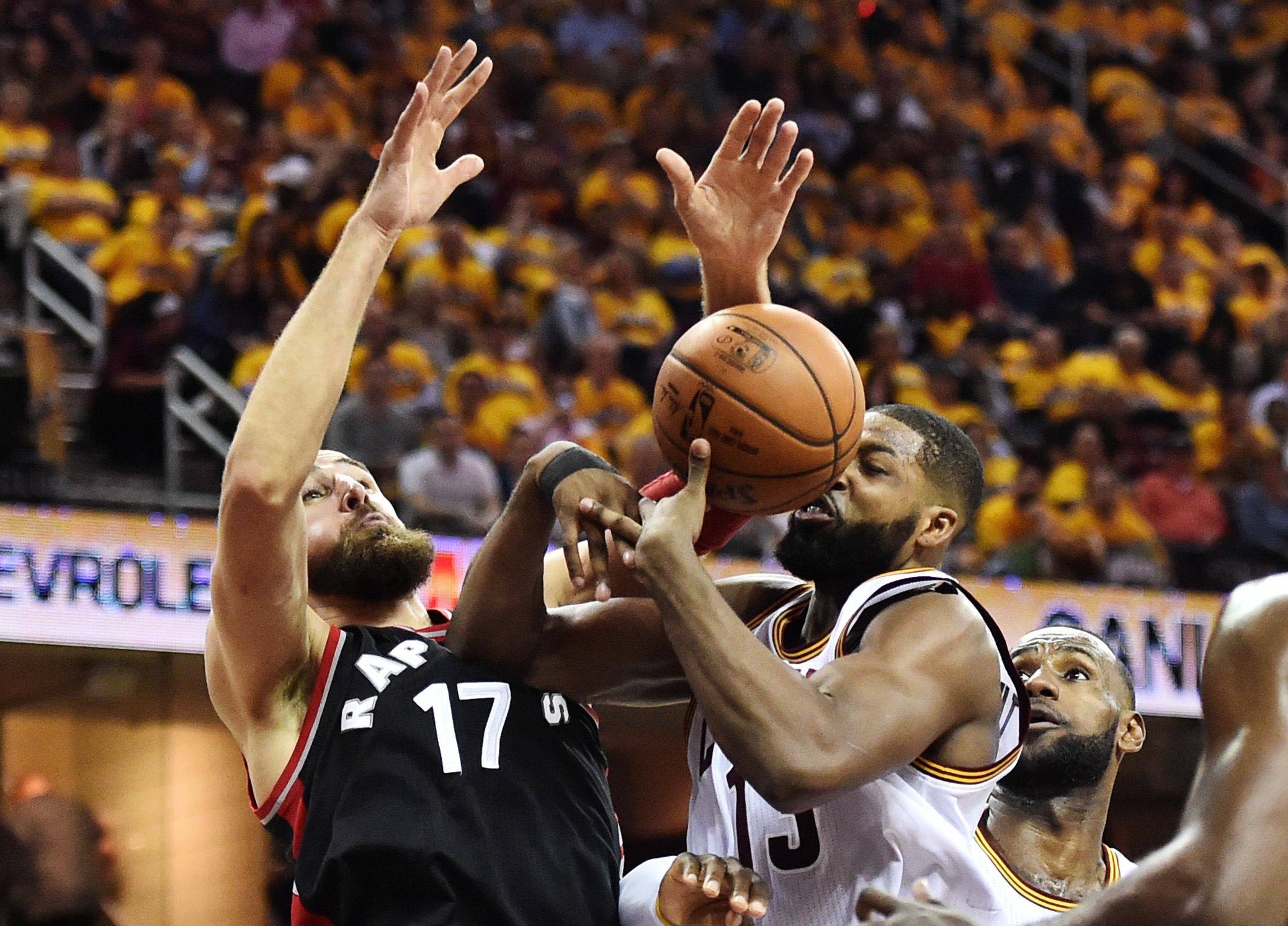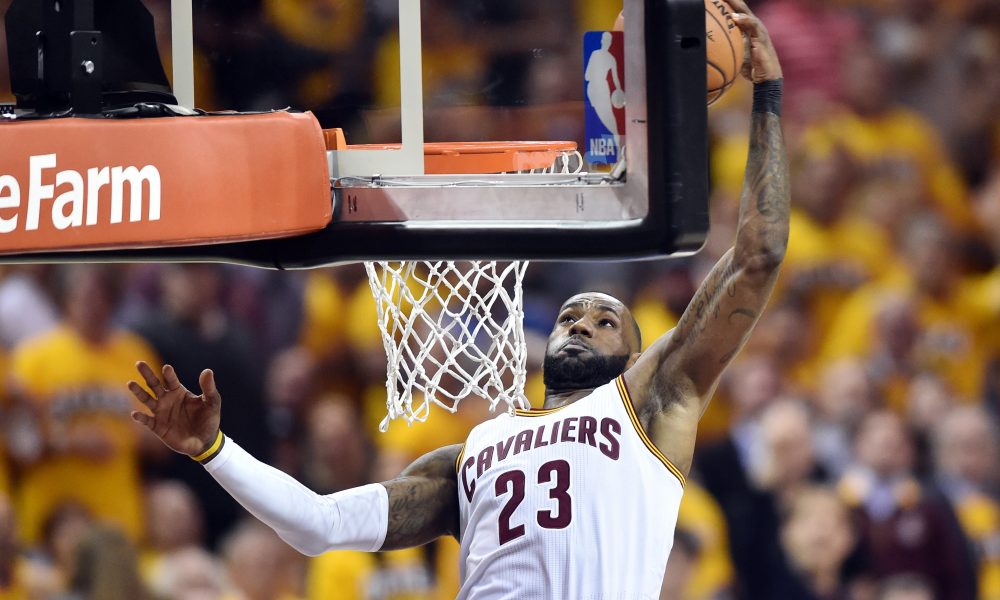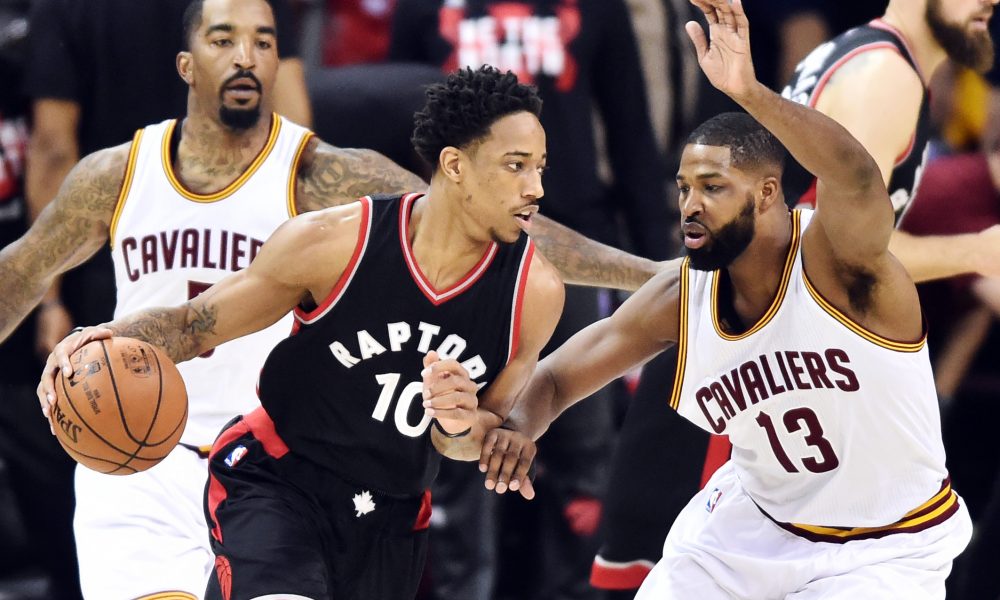Returning Jonas Valanciunas to the starting lineup for Game 1 against the Cleveland Cavaliers on Monday was a justifiable move.
The Toronto Raptors weren’t going to banish their young, long-time starting center out of the rotation entirely to begin the series, and while the team had struggled with Valanciunas starting against the Milwaukee Bucks, the Cavaliers present a different matchup. Most notably, the Cavaliers only employ one even remotely traditional center in Tristan Thompson, and their other options at the position – Channing Frye, Kevin Love, or occasionally LeBron James – are difficult to impossible matchups for Valanciunas. Yes, the Lithuanian can help limit the post-up game of Love or abuse Frye on the glass, but his two biggest weaknesses are likely defending pick-and-rolls with fast point guards like Kyrie Irving, and chasing pick-and-pop bigs like Frye and Love.
Tethering Valanciunas’ minutes to Thompson’s then, makes sense, even if the latter has outplayed the former in prior meetings. The hope had to be that Valanciunas’ physicality, rebounding, and occasional post-ups and garbage points would swing that matchup something close to even, which would then allow the Raptors to play small later in halves and, most importantly, against Cleveland’s own smaller looks. The onus was on Valanciunas to perform, and the Raptors were putting him in the best position to do so within the context of this series by starting him.
Things did not go well in Game 1 on Monday. The Raptors starters, as is their custom, were a minus-10 in 13 minutes together, and Valanciunas was a -21 in 21 minutes, worse than anyone not named DeMar DeRozan. This, despite Valanciunas’ minutes coming entirely against Thompson. Not only did the Raptors have a -50.8 net rating with Valanciunas on the court (even worse than DeRozan, or anyone else), he grabbed just 14.3 percent of available rebounds, well below his elite season mark of 20.8, and the Raptors as a team only grabbed 40.5 percent of rebounds during that stretch (a team-wide issue, to be sure, and a product of Cleveland not, you know, missing shots). The defense with the starting unit was atrocious, largely due to breakdowns from Valanciunas or DeRozan, and it let the Cavaliers find a quick energy.
“Once you let them see the basketball go in, it’s kind of contagious for them, and that’s what happened for them tonight,” DeRozan said. “We gotta put defense in the game for 48 minutes.”
The Raptors even tried posting Valanciunas up to get the most out of his presence on the floor. On four post-ups, he committed one turnover, fell down once leading to a scrambled possession, and scored twice. That’s…not great. Neither is Valanciunas’ rate of 0.77 points per-possession on post-ups for the entire postseason, a mark that comes with a 15.4-percent turnover rate. This underscores a bit of a dirty secret about Valanciunas, in that despite cries for him to receive more post touches, his effectiveness there has dropped off. In the regular season, he averaged 0.9 points per-possession on post-ups, in the 56th percentile league-wide. That’s not bad, and it’s right in line with 2015-16 (61st percentile), but it’s a far cry from earlier in Valanciunas’ career, and he’s continued to turn the ball over every eight or nine touches, death to Toronto’s transition defense.
This didn’t set out to be overly negative about Valanciunas, but to provide the context that even when he’s getting the ball, Valanciunas isn’t really tilting things Toronto’s way in the postseason. He could get more touches, with more action over top of him to prevent double-teaming or digging in, to be sure. But he’s also not playing well enough to warrant it, outside of two, maybe three games off the bench against Milwaukee. For the postseason as a whole, the Raptors have been 11.6 points per-100 possessions worse with Valanciunas on the floor, and only DeMarre Carroll has a worse defensive rating.
All of this is building to a tough question for Dwane Casey and the Raptors: What is Valanciunas’ place in this series?
That’s a complicated question. Because again, Valanciunas doesn’t have a ton of utility off the bench here (Thompson played 38 minutes, for what it’s worth, so he could still steal some minutes away from Frye in that role, although not many), and taking him out of the starting lineup again may mean banishing him from the series altogether. If Valanciunas isn’t going to be used in a bench role much, it means he might be excised for Jakob Poeltl, who has proven steady but whom the Cavs figure to attack relentlessly in order to test the resolve of. Lucas Nogueira, benefits though he brings, was inactive in Game 1 and probably can’t be considered an option. Maybe we’re overthinking the Frye matchup because of his history against the Raptors and Valanciunas would be passable in a bench role.
Moving Valanciunas to the bench comes with a serious cost, though. Removing Valanciunas means sliding Serge Ibaka to center to start games, which means a wing or Patrick Patterson (who has the worst net rating on the team) would have to slot in and, likely, guard Kevin Love. The Raptors talked up the value of having Ibaka for the Love matchup, and the team will have to decde whether giving Love more post-up opportunities in order to downsize and get Ibaka closer to the rim is a worthwhile trade-off. It might be – Love post-ups mean the ball is out of LeBron James’ hands and it means Love isn’t on the 3-point line, but tasking a smaller player with that assignment brings problems, and Love is not only a strong post scorer but a terrific passer and elite rebounder. Starting Norman Powell would put him or DeRozan on Love, assuming the Raptors would still want Carroll on James, while starting Patterson, while tolerable defensively, maybe doesn’t provide the exact boost the Raptors seem to be looking for.
“Speed and quickness I thought was the difference, especially in certain areas,” Casey said of the team’s good stretches of play. “I thought we played in spurts, I think we cut it to five or whatever it was early in the game but it was speed and quickness that made the difference and I thought Norm and Delon give us that. I thought both of them created, got us open looks. At the end of the day, you’ve got to knock them down, but I thought both of them were aggressive with their speed and quickness and playing with force. That was a positive for us.”
That would seem to indicate that Casey was happy with the play of Powell, in particular, who was a plus-14 in 21 minutes and a plus-5 in 17 minutes if you subtract the time Raptors 905 spent making the margin of defeat look more respectable. Powell provided the shot in the arm the Raptors needed against Milwaukee, and he’s easily been the best of the team’s supporting cast in the postseason. In Powell’s 141 minutes, the Raptors have outscored opponents by 21.4 points per-100 possessions, a difference of 38.3 from when he sits. Even controlling for some noise, garbage time, and nuance there, that’s a profound impact.
“I think he needs to play a lot. With him on the court, I think they are a lot more dangerous,” Luis Scola told TSN radio in a great interview this weekend. “I don’t see any other way the Raptors can compete without using Norman.”
The issue, again, is the matchup problems starting small against Cleveland creates. There’s a simpler option to goose the defense that the Raptors could go to, one that gives Valanciunas an extended leash to try to assert himself while also making sure the Raptors put a better foot forward, and that’s starting Tucker over Carroll. That’s appeared to be an obvious move for some time now, and Tucker did a better job on James than Carroll on Monday night. It’s not a dig at Carroll, but James is James and Tucker is an elite defender – the Raptors own a 96.7 defensive rating with Tucker on the court during the playoffs to 113.9 with Carroll, the team was more or less even with Tucker on the floor in Game 1, he rebounded well enough to allow the Raptors to play smaller.
“We got stops and got into transition. We were scrambling a lot more. We got a lot of stops,” Lowry said. “We got out in transition and were able to run. We affected the game on the defensive end. Our defense created our offence in that span.”
Toronto could even make both changes, betting on a Lowry-Powell-Tucker trio that’s been pretty good all postseason to help kick-start games with the give-a-shit meter turned up to 11. There are matchup problems presented like that still, but there’s versatility and speed built into that group, and the benefits may outweigh the negatives. Patterson figures in as an option, too, standing as a bit of a half-measure between maintaining the status quo and going all the way small out of the gate (he’s a fine option on Love).
The Raptors will probably give the current starting lineup one more game to figure things out. I predicted before the series that a change wouldn’t come until Game 3, and there was nothing Casey said Monday to make me believe otherwise. They’re not going to live or die by small-sample on-off numbers that contain some noise and are devoid of context, because they shouldn’t, but those numbers are just helping describe what’s been patently obvious in the qualitative realm. The Raptors’ starting lineup hasn’t been getting it done, and doesn’t figure to start. The margin for error against a team like the Cavaliers is simply too small to keep banging their head against the wall hoping to figure it out. None of the options are perfect or even eminently palatable, but the point is, several options exist, and the situation is too urgent not to try something – it’s not a one-game overreaction, it’s a response to the realities of the series and playing the role of underdog.
Note: Some have asked on Twitter. I think I’d go Lowry-DeRozan-Tucker-Patterson-Ibaka. Powell has been great, but I kind of dread a Love size mismatch and really like Powell off the bench against the Cavs’ slow-footed bench. I’m flexible, though.



